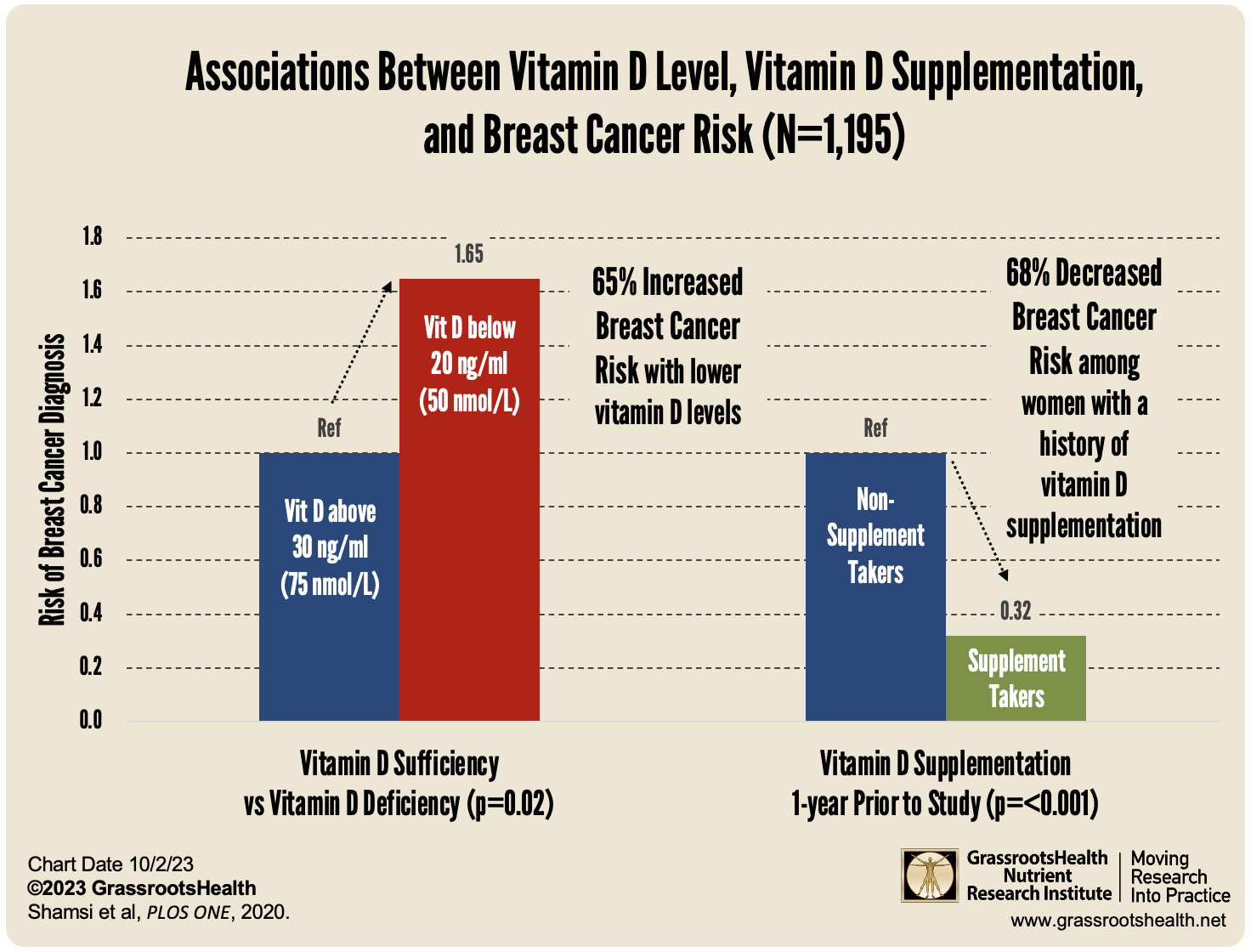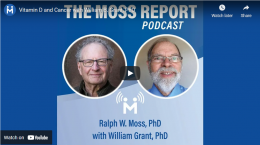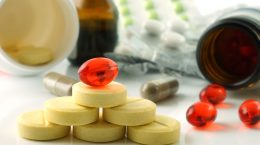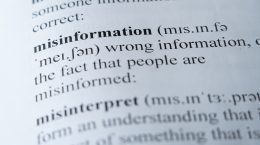Published on October 17, 2023
“…it looks like half of the cancer rates could be reduced by bringing people up to 60 or 70 ng/ml [of vitamin D], that could wipe $50 billion off the industry.” Dr. William Grant
Key Points
- Dr. William Grant is a world expert on vitamin D, and is also the author of approximately 300 PubMed-listed articles on vitamins, more than half of which concern the relationship of vitamin D to cancer
- Many studies demonstrate the effects of vitamin D on cancer risk reduction, including Shamsi et al, which showed a 65% increased risk of breast cancer for those with vitamin D deficiency, and a 68% decreased risk among those who had been supplementing with vitamin D
- As opposed to pharmaceutical drugs, vitamin D has mainly health benefits, including a reduced risk of diabetes, respiratory infections, autoimmune diseases, falls and fractures, dementia et cetera, et cetera… and the cost is ridiculously low!
In the podcast featured below, “Vitamin D and Cancer with William B. Grant, PhD,” Dr. Ralph Moss talks with GrassrootsHealth scientist panel member Dr. William Grant, who is one of the leading experts on vitamin D and cancer and the founding director of the Sunlight, Nutrition, and Health Research Center (SUNARC) of San Francisco. Dr. Grant is also the author of approximately 300 PubMed-listed articles on vitamins, over half of which concern the relationship of vitamin D to cancer.
Dr. Moss is the host of “The Moss Report,” which features in-depth conversations about alternative, complementary, and innovative cancer treatments. Listen in after reviewing today’s highlighted research study.
Is it Real? The Connection Between Vitamin D and Cancer
This month, to highlight prevention during Breast Cancer Awareness month, we have featured several studies showing a nearly 70% or greater reduced risk of breast cancer with higher vitamin D levels. One of the studies shared on breast cancer mortality concluded that the vitamin D level of breast cancer patients accounted for 97% of the variance in mortality outcomes – meaning the vitamin D level made almost all the difference.
Results from many studies on vitamin D, cancer risk and outcomes, and other key nutrients and lifestyle habits, such as omega-3s and exercise, magnesium, and selenium are summarized in our new eBooklet. One study by Shamsi et al. (reviewed below and included in the eBooklet) is just one example to demonstrate the strong relationship between vitamin D, sunshine, and breast cancer risk.
Higher Vitamin D Levels, Vitamin D Supplementation, and Sun Exposure Found to be Protective Against Breast Cancer
A 2020 study by Shamsi et al. found that lower vitamin D levels among women, and certain lifetime sun avoidance behaviors, resulted in a higher risk of breast cancer diagnosis. Their matched case control study evaluated data from 411 women who were newly diagnosed with breast cancer and compared it to 784 controls who were free of breast or any other cancer. Vitamin D levels were taken from samples obtained within 30 days of cancer diagnosis and prior to chemotherapy. Those with levels below 12 ng/ml (30 nmol/L) were labeled as severely deficient, between 12-19 ng/ml (30-49 nmol/L) as deficient, 20-30 ng/ml (50-75 nmol/L) as insufficient, and greater than 30 ng/ml (75 nmol/L) as sufficient. Questionnaires assessed previous vitamin D intake and estimated lifetime sun exposure and behaviors.
The study found that
- while vitamin D deficiency was high among both groups, those with breast cancer had a higher incidence of both severe vitamin D deficiency (39% vs 33%) and deficiency (29% vs 24%) compared to controls
- women with vitamin D deficiency (below 20 ng/ml) had a 65% increased risk of breast cancer compared to women with vitamin D sufficiency (above 30 ng/ml) (p=0.02)
- women who supplemented with vitamin D one year prior to study enrollment had a 68% decreased risk of breast cancer (p=<0.001)
- women who practiced sun avoidance behavior or with minimal exposure to sunlight due to their outside attire (who wore the chadder and/or burqa) all had a significantly increased risk of breast cancer compared to women who did not avoid sun exposure or who did not wear those types of clothing
This study concludes
“vitamin D deficiency is an easily modifiable risk factor for reducing the incidence of breast cancer.”
The Moss Report: “Vitamin D and Cancer with William B. Grant, PhD”
Approximately 42 minutes
Podcast Summary
Below is a brief summary of this Moss Report podcast. For the full transcript, visit vitamindwiki.com.
Alzheimer’s (3:10)
How Dr. Grant transitioned from working in physics with NASA to becoming a world health expert, most notably in vitamin D
Dr. Grant takes 5,000 IU daily, is at 60 ng/ml (150 nmol/L) (14:12)
Discusses testing vitamin D levels every 6 months as part of the GrassrootsHealth study, and the papers that GrassrootsHealth has published thanks to such participation!
VITAL: Restricted to 2000 IU of Vitamin D (16:15)
While the VITAL trial did find a significant 25% reduction in cancer incidence for those taking vitamin D, when considering BMI, the treatment group was only given 2000 IU/day while the control group was allowed up to 800 IU/day – a minimal difference in intake, and no comparison by achieved serum level
One doctor prescribes 50,000 IU weekly for Cancer (D2) (20:02)
Listen in to a great discussion on the difference between vitamin D2 and vitamin D3
Prostate Cancer (23:42)
According to Dr. Grant, while higher levels of vitamin D or greater sun exposure may increase prostate cancer incidence (due to higher calcium levels), higher vitamin D levels are shown to reduce the risk of aggressive prostate cancer and reduce prostate cancer mortality risk
Hollis: low grade prostate with tumors reduced by 4,000 IU daily for a year (27:29)
Daily vitamin D may be an important approach to the treatment of prostate cancer; daily vitamin D has been shown to reduce cancer risk overall compared to bolus dosing
OK to take 50,000 IU weekly (30:58)
A discussion about dosing and toxicity
One person accidently took 1,000,000 IU daily for a while and got to 900 ng (32:32)
Listen in to what happened…
Suspect getting people to 60-70 ng level would eliminate $50 billion of US Cancer treatments (36:15)
“…it looks like half of the cancer rates could be reduced by bringing people up to 60, 70 nanograms per milliliter, that could wipe fifty billion dollars off the industry”
Disinformation Playbook (37:53)
“And as opposed to pharmaceutical drugs, vitamin D has mainly health benefits. Reduced risk of diabetes, respiratory infections, autoimmune diseases, falls and fractures, dementia et cetera, et cetera… And the cost is ridiculously low. So it’s got everything going for it. So I guess this is a word to the wise people who are listening to this podcast, they should take this to heart and look into this some more.”
For the full transcript, visit vitamindwiki.com.
Take steps for your own health to ensure optimal vitamin D levels – for your family and loved ones as well – by measuring at home today.
Save when You Measure Your Levels Today!
Other nutrients are essential to our health as well, including vitamin D, magnesium, selenium, and omega-3s; measuring these can help determine if more of these nutrients might be needed to provide the greatest risk reduction for disease and improve health outcomes.
For example, the Immune Boost Panel Test Kit includes each of these measurements:
- Vitamin D
- Omega-3 Index
- Magnesium PLUS Elements
- hsCRP as a marker of inflammation
Get the Immune Boost Panel Here
Having and maintaining healthy vitamin D levels and other nutrient levels can help improve your health now and for the future. Enroll and test your levels today, learn what steps to take to improve your status of vitamin D (see below) and other nutrients and blood markers, and take action! By enrolling in the GrassrootsHealth projects, you are not only contributing valuable information to everyone, you are also gaining knowledge about how you could improve your own health through measuring and tracking your nutrient status, and educating yourself on how to improve it.







